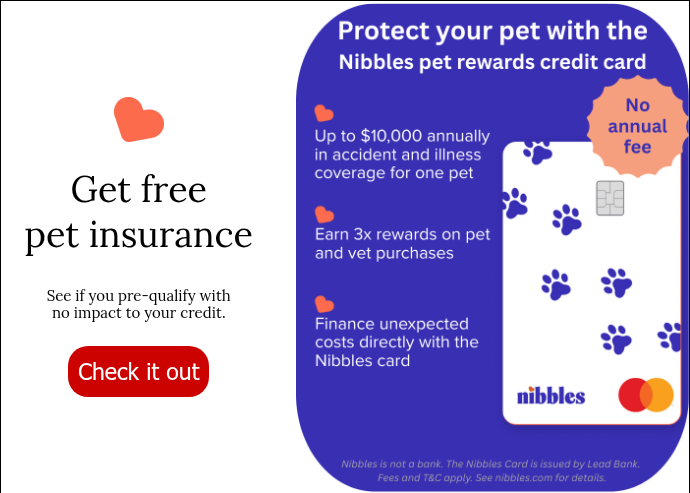
I don’t know about most other people, but I go nuts for nuts. I love just about all types, regardless if they are whole, chopped, or made into a butter form.
But sadly, while they offer many health benefits, many folks can’t have nuts for one reason or another – some of which are serious reasons. This same scenario is true for pets.
We all like to share our snacks with our pets – even if we don’t admit it! So it is important to know if you are nutty for nuts like me, which ones are safe to share, and which ones you must truly keep for yourself.
Skip to section:
Can Dogs and Cats Eat Nuts? What Are the Benefits?
Let’s discuss the goodness of nuts first! We all know nuts are nutritious. But can safe ones provide any health benefits to our pets? The simple answer is yes. Here are just a few of the benefits that they can offer:
- They can be a good source of protein. Protein is an essential nutrient for our pets.
- They provide amino acids, such as arginine. This particular amino acid is important in the production of nitric oxide. Nitric oxide helps with blood circulation.
- Some nuts, along with peanuts (which are technically a legume, but we all welcome them with the nuts) can help reduce high blood pressure.
- They are a source of fiber. This can be helpful with constipation.
- They are a source of vitamins, such as vitamin C, which helps support the immune system.
- They are a source of B1 and B2, which can help counter fatigue and stimulate appetite.
- They can also be a source of potassium, iron, and copper.
- They are a source of healthy fats.
How Can Nuts Harm Pets?
Unfortunately, there is always bad with the good. Feeding nuts to your pet is no different.
- Nuts are dense in calories. Too many too often can contribute to your pet becoming overweight.
- Nuts are high in fat. If too many are consumed, it could cause pancreatitis.
- Some nuts are toxic for dogs and cats.
- They can be a choking hazard. Some of the smaller nuts can cause intestinal blockages as well as be a choking hazard.
- Their high fiber content and the fact that they can be hard to digest can lead to stomach upset.
- Coatings on some nuts can cause gastric irritation and also be potentially harmful to pets. For example, some nuts are heavily coated with salt. Excessive salt can lead to sodium ion poisoning.
- If eaten, the shells of nuts can cause trauma to the gastrointestinal lining.
Safe Nuts to Give Pets
As will all things in life, moderation is key. Only give nuts with extreme care, and be sure to monitor your pet in case they choke on a nut. DO NOT give your pet too many nuts, even if they are on this ‘safe list.’ It can lead to stomach upset with possible vomiting and diarrhea, as well as pancreatitis.
- Peanuts – plain and not in a shell
- Hazelnuts – plain
- Roasted cashews – plain and shelled. DO NOT feed raw cashews!
- Pine nuts – plain and only in very small amounts due to their very high-fat content.
Peanut Butter Safety: Some peanut butter brands have the all-natural ingredient xylitol (made from birch bark or corn). Xylitol is extremely toxic to dogs and cats.
This peanut butter made by Crazy Richard's (or this one by CB's Nuts) lists just one ingredient: peanuts. If your grocery store has a natural foods section, look for a peanut grinder so you can make your own one-ingredient peanut butter.
Warning for Cats
As a note, giving nuts to cats is generally not a good idea. Cats are more likely to suffer from choking and obstruction of the esophagus, stomach, and intestines from nuts, more so than dogs. Additionally, the high-fat levels and dense calorie count are other reasons cats should avoid them. Cats can suffer from pancreatitis, just like dogs.
But if your cat does happen to consume one or two nuts, they likely don’t need to go to the vet. Monitor them closely for choking, stomach upset (vomiting and/or diarrhea), loss of appetite, etc.

Nuts That Are Toxic for Pets or Should Be Avoided
- Macadamia nuts – Very toxic to dogs. Can cause weakness, inability to walk, vomiting, tremors, and hyperthermia in dogs. Symptoms usually begin within 12 hours of ingestion.
- Black walnuts – Very toxic to dogs. Can cause vomiting and neurologic symptoms.
Note: English Walnuts are the most common ones used for baking and cooking. They are the safest of the walnuts and not toxic to your dog. However, they can mold like other walnuts, which can make pets sick. Even though they are not toxic, they are very high in fat, and because they are larger, they are harder for pets to digest, especially if they don’t chew them. - Old and moldy walnuts – Very toxic to dogs and cats. Can cause tremors and seizures.
- Raw Cashews – Should be avoided for dogs and toxic for cats. Raw nuts contain compounds that make them harder to digest than roasted/cooked nuts, which can increase the likelihood of stomach upset. They can cause toxic-like effects in some cats (causes unknown).
- Pistachios – Should be avoided for dogs and cats. Pistachios are high in fats (which can cause pancreatitis and stomach upset. Due to their size and the fact they often have a shell, they are a choking hazard, hard to digest, and can cause intestinal blockages (especially in small dogs and cats). They can also grow a mold that can damage the liver of dogs. They are often seasoned with salt, onion, and garlic (with the last two ingredients being toxic to pets).
- Hickory nuts – Should be avoided for dogs and cats. Due to their large size and shells, they often cause intestinal blockages and can be a choking hazard, especially to cats and small dogs. Moldy ones contain tremorgenic mycotoxins, which can cause seizures or neurological symptoms.
- Pecans – They are not directly toxic, but like walnuts, they tend to mold. These are various microorganisms, including toxigenic and pathogenic fungal species, that can't be easily seen by the naked eye. These molds, even a small amount, can cause seizures and nerve damage. They also can cause gastrointestinal distress and blockage.
- Almonds – While not directly toxic, it is recommended that they not be given to pets since they are a significant obstruction hazard (they are hard for pets to break down, and pets don’t always chew their food well). For small breed dogs, they may inhale them into their windpipe.
They can potentially cause severe gastrointestinal upset due to their high-fat content as well as pancreatitis. They are often heavily salted, which can cause water retention. For pets with heart disease, this can be dangerous. Almonds are also prone to mold like pecans and walnuts. - Brazil nuts – They are not toxic (see note below), but they are hard to digest and are high in fat (one of the fattiest). This can be especially problematic for dogs with hyperlipidemia (high amount of fat in the blood) and those pets that have a history of pancreatitis.
Note: In some rare cases, Brazil nuts have led to selenium (a mineral found in soil) poisoning in humans. The toxic dose of selenium is about 1 mg/kg for dogs. In our research, each Brazil nut can contain between 0.68 to .98 mg of selenium. Therefore, if a dog a small dog (about 5 lbs), for example, consumes one, they should be safe. But it is always better to act cautiously and contact a veterinarian if your pet has consumed Brazil nuts.
For $5, you can speak to a veterinarian if you're concerned about nuts or seeds your dog or cat ate.
Connect with a veterinarian now
Rates may differ for those residing outside the U.S. You'll have access to a vet for 7 days.
Symptoms of Nut Toxicity in Pets
If you know your pet has consumed nuts and you see any of these symptoms, contact your veterinarian right away.
- Vomiting
- Diarrhea
- Lack of poop for a couple of days
- Bloating
- Fever
- Rapid heart rate
- Abdominal pain (groaning, rapid breathing, touch avoidance)
- Loss of appetite
- Weakness
- Tremors
- Difficulty walking or weakness in legs
- Seizures
- Bloody stool – may appear black like tar
- Orange-colored urine

The Scoop on Seeds
While I know that this article is supposed to be about nuts, I often find they are yummy when paired with seeds. So, I thought a quick note about seeds might benefit you are your pet.
Like nuts, seeds are high in fat and dense in calories. Therefore, the same rules apply:
- You can only give in moderation
- Do not give in the shell
- Do not give them if they have any coatings on them
- They can be a choking hazard, so monitor your pet carefully when giving them
Safe Seeds for Pets
- Shelled and unsalted sunflower seeds: Note they are very high in fat, so use a few very sparingly.
- Ground and cold-pressed flax seeds: Dogs less than 50 lbs can get ¼ tsp per day; dogs larger than 50 lbs can get 1 tbsp per day; cats (benefits questionable) can get ¼ to ½ tsp of total daily caloric requirements. This is an organic flaxseed meal brand.
- Chia seeds: It is best to soak them in water before feeding them to prevent expansion in your pet’s stomach. Dogs and cats can get ¼ tsp of chia gel per 10 lbs daily.
- Unsalted (ideally ground) pumpkin seeds. They are high in fat, so give sparingly.
Questions? If you're concerned about nuts or seeds your dog or cat ate, you can chat with a veterinarian now. Click here
Toxic Seeds for Pets
To make life simple, just assume that all fruit seeds (except those in a cucumber, unless too much is given) are toxic or pose some type of hazard (choking, intestinal blockage, etc.).
And if you're thinking of sharing trail mix (nuts and seeds), beware of raisins, as they are toxic to dogs and cats.
Remember, just because most of us can enjoy healthy foods like nuts and seeds and reap their benefits, that isn’t always the case for our furry friends. When in doubt, don’t give your pet anything if you are unsure if it is safe or not. The best thing to do is give your pet treats designed just for them!





